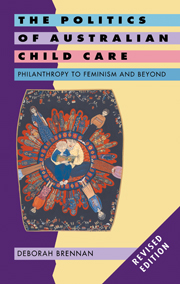Book contents
- Frontmatter
- Contents
- List of tables
- Acknowledgements
- List of abbreviations
- Preface to the Revised Edition
- Introduction: Women, the State and the Politics of Caring for Children
- 1 The Kindergarten Movement and Urban Social Reform
- 2 For the Sake of the Nation
- 3 A Mother's Place …?
- 4 Hitching Child Care to the Commonwealth Star
- 5 Playing Beneath the Sword of Damocles
- 6 For Love and Money
- 7 Child Care – an Industrial Issue
- 8 New Players, New Rules
- 9 Equity and Economics
- 10 The Market Rules … OK?
- References
- Index
4 - Hitching Child Care to the Commonwealth Star
Published online by Cambridge University Press: 26 January 2010
- Frontmatter
- Contents
- List of tables
- Acknowledgements
- List of abbreviations
- Preface to the Revised Edition
- Introduction: Women, the State and the Politics of Caring for Children
- 1 The Kindergarten Movement and Urban Social Reform
- 2 For the Sake of the Nation
- 3 A Mother's Place …?
- 4 Hitching Child Care to the Commonwealth Star
- 5 Playing Beneath the Sword of Damocles
- 6 For Love and Money
- 7 Child Care – an Industrial Issue
- 8 New Players, New Rules
- 9 Equity and Economics
- 10 The Market Rules … OK?
- References
- Index
Summary
Any function or activity which can be hitched to the star of the Commonwealth grows in quality and affluence. Any function or activity which is financially limited to the States will grow slowly or even decline. Further, a function will be fairly financed to the extent that the Commonwealth finds the money for it. A function will be unfairly and inadequately financed if the whole burden falls upon the States.
E.G. Whitlam, ALP Policy Speech, 1972The period of the Whitlam government, although brief, was a time of significant change in social policy. Although the economy was beginning to slow after the ‘long boom’ of the 1960s, Labor's mood was one of expansion and optimism. The new government regarded social welfare as a fundamental aspect of the wellbeing of all citizens. It placed considerable emphasis on the provision of services (such as health, child care and education) which benefitted a wide range of people. This contrasted with the approach of earlier postwar administrations which had generally adopted a much narrower definition of ‘welfare’ and which had focused on cash transfers (such as pensions and benefits) targetting the poor, rather than on the provision of universal services. These changes led to intense debate about the role of the commonwealth in the provision of social welfare, the legitimate targets of public expenditure (particularly the acceptability or otherwise of ‘middle-class welfare’) and the most appropriate means of delivering services.
- Type
- Chapter
- Information
- The Politics of Australian Child CarePhilanthropy to Feminism and Beyond, pp. 70 - 95Publisher: Cambridge University PressPrint publication year: 1998



